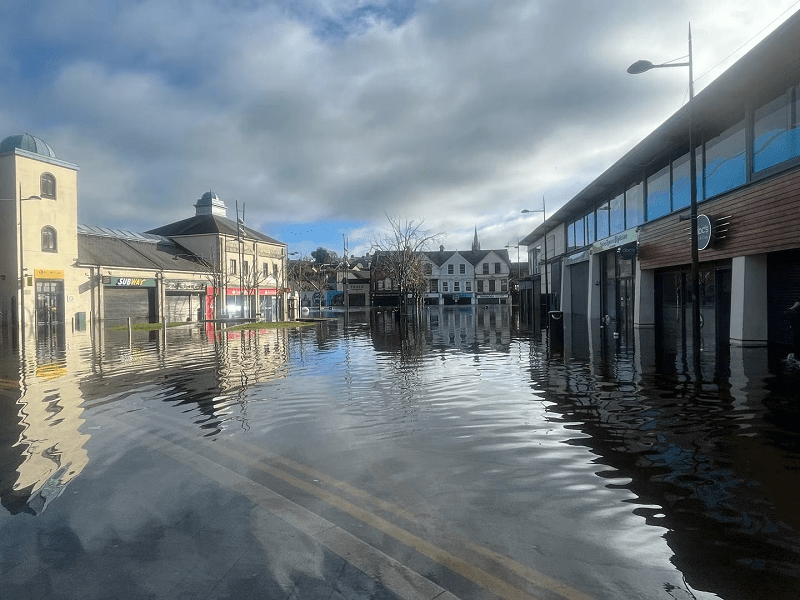In Short : The statement highlights the urgency of addressing climate change impacts, particularly in vulnerable regions prone to flooding. As climate change continues to intensify extreme weather events, governments worldwide must implement robust policies around flood defenses, including investing in resilient infrastructure, early warning systems, and sustainable land use planning. Adaptation strategies, community engagement, and international collaboration are essential to mitigate the devastating effects of climate change-related flooding and safeguard communities.
In Detail : Residents and businesses in Carlingford and Downpatrick continue to count impact of rising waters
A significant change in policy direction is required to allow for the timely construction of infrastructure such as flood defence as the State adapts to the threat of climate change, the Minister for State at the Office of Public Works (OPW) has said.
“The reality is our climate isn’t changing, it’s changed,” Patrick O’Donavon told reporters in Carlingford during a visit to the Co Louth village after it was hit by significant flooding earlier this week. “We have to be allowed to address that change with a greater level of speed (than) we’re being allowed at the moment.”
He added: “Climate adaptation for villages and towns like Carlingford involves significant infrastructure development that require planning permission, and for us to be able to do that with the local authorities – the same in Middleton – will involve, I believe, a significant change in the policy direction as to how we’re currently doing it.”
Mr O’Donovan and Minister for Social Protection Heather Humphreys visited Carlingford on Friday to meet locals impacted by the flooding. Ms Humphreys confirmed that that those affected would be eligible for the same level of compensation – up to €100,000 – afforded to those impacted by Storm Babet last month.
“The same will apply right across the country,” she said.
Mr O’Donovan admitted that changing climate patterns will cost the State “an awful lot of money” in the not too distant future. “The extent to which that change happens over the next five to 10 years will obviously have a big impact on the exchequer.”
Over the last three years, he said he has visited numerous communities hit by the same issues as Carlingford and other parts of the country in the past month.
“This is happening with a great level of, I would say almost, violence, that’s coming in terms of the storms, and in terms of the weather patterns, and the frequency,” he added. “We haven’t even entered the winter yet and the land is completely saturated.”
The Fine Gal politicians on Friday met Sharon McGuigan, the owner of the Carlingford Arms, which was one of several businesses in the tourist village impacted by the floods. The hotel reponed on Friday but was not insured for flood damage.
“Everyone was here to try and help us, but there was just nothing we could do [to stop the water],” Ms McGuigan told The Irish Times. “We got extra sandbags, we tried our best – as the water was coming in we were brushing it out, but there was just no control.”
She said getting back to normal “will be expensive” as further flood-related issues are detected.
“As we’re going on, as we’re getting open, we’re finding out more problems. We thought all the fridges were open, but the sockets, there’s a lot of stuff still damp and not working at this moment in time.”
Meanwhile, business owners and residents in Downpatrick, Co Down have say the town has been left feeling “hopeless” by flooding that has shown little sign of subsiding.
Efforts to manually remove floodwater with pumps have not been able to begin due to persistent high water levels in the River Quoile, which runs beside the town, described as being like a bowl, with flood water unable to flow out of its centre.
A number of businesses along the main street have been flooded with up to 10ft of water, with owners unable to enter to assess the damage and employees left with no idea of when they will return to work.
At the perimeters of the flood, where the water has slightly receded, muck and litter left behind offers a glimpse into the future clean-up operation Downpatrick residents will face.
Paul Hamill, who owns a barbershop on Market Lane, one of the worst affected areas of the town, said he would be unable to trade again until the water completely recedes.
“I’m lucky that it has receded just enough to get me and my colleagues in to help me clear it out, it’s devastating for the town, absolutely devastating,” he said.
“Being this far up the town, Market Lane, we thought we might just be lucky enough to get away with it not flooding, but as the hours passed, it just ebbed in further and further.”
He said that the damage caused to the premises, combined with the loss of earnings, could cost some £10,000.
Dr Tim Campbell and other employees of the Saint Patrick Centre were offering hot drinks and sandwiches to people salvaging what could be saved from their businesses in Downpatrick on Friday.
He said many people in the town felt “hopeless”.
“All we can do is watch the tide rise,” he said. “So, the centre we’re very lucky to be a few feet above this devastating flood that’s hit the businesses in Downpatrick and we’re trying to help out as much as we can.”
Dr Campbell said the town now “desperately needs to look at the flood defences”.
The North’s Department for Infrastructure said that “every effort is being made to begin pumping as soon as possible, as the department and our multi-agency partners are keen to do all that we can to reduce the impacts of the flooding in Downpatrick”. Additional reporting.

